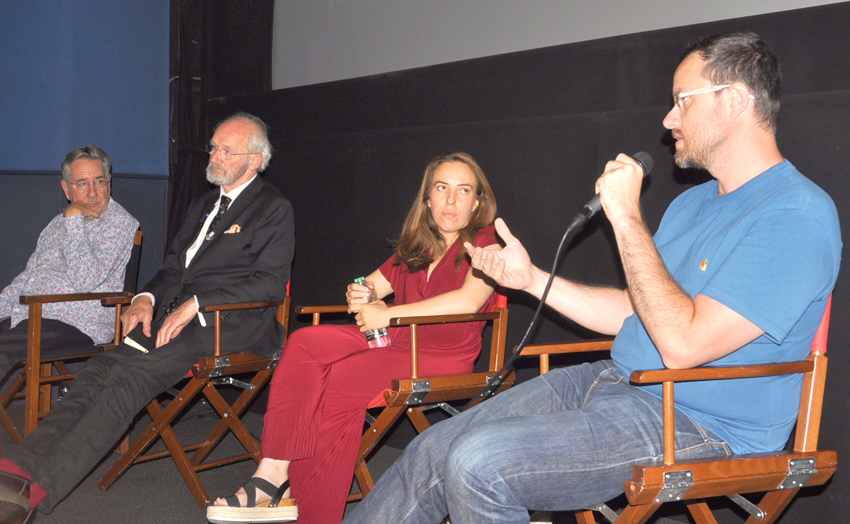
ITHAKA – The film title is from a Greek poem – a long journey and the overcoming of obstacles through the knowledge gained on that journey.
It was shown on Saturday night at the Ritzy cinema in Brixton, one of many showings around London, and also touring main cities around the country.
It is about the long struggle for the freedom of WikiLeaks founder Julian Assange – a battle against imperialist powers, the US and UK governments, who are desperate to cover up their crimes that have cost the lives of millions across the globe.
In revealing these crimes Assange has done a great service to the millions who want to know what is really going on behind the massively financed propaganda machines of those powers.
Assange remains a prisoner in Belmarsh high security prison where he has been held since being snatched and arrested at the Ecuadorian embassy in April 2019 where he had been seeking asylum since February 2003.
He is appealing an extradition order to the United States, where he could face 175 years in prison.
A clip shown at the beginning of the film showed a US helicopter crew in Iraq blatantly opening fire on a group of unarmed men who included journalists.
WikiLeaks revealed thousands of such crimes in such films and documents which would otherwise have been hidden by the military.
A scene from the huge two million-strong demonstration in London against the war on Iraq on February 15th 2003 was shown, and it was pointed out that, along with other demonstrations across the world, this was the biggest protest in history.
None-the-less, the protests were ignored by those in power and the bombing began.
Ithaka, a Father, a Family, a Fight for Justice, was filmed over the last two years by Australian filmmaker Ben Lawrence and produced by Julian Assange’s brother Gabriel.
There are many, often emotional interviews in the film with Julian’s father, John Shipton, around the kitchen table, outside the Old Bailey and during his globetrotting campaign for justice.
John has a young daughter who misses her father as he is constantly travelling around Europe with visits to the US – a different life from his trade as a carpenter and housebuilder.
There are interviews and scenes of Julian Assange’s family life, with his wife Stella Moris and their two children Max and Gabriel whose contact with their father is mainly via a mobile phone.
Dad recommends which children’s books to read – ‘it’s “Going on a Bear Hunt” – or was it a “Lion Hunt”?’
Stella refers to her upbringing in South Africa and the struggle of her parents against the Apartheid regime which she sees as being embodied within her.
The majority of the documentary follows Assange’s legal battles in 2019 and 2020 in the build-up to the first British court case.
John Shipton makes the point succinctly: ‘Julian can no longer speak for himself; his family and friends must speak for him.’
After the film there were questions and answers with the audience, John and Gabriel Shipton, and Stella Moris, chaired by John Rees from the Don’t Extradite Assange Campaign.
Stella Morris paid tribute to the grassroots campaign where the weekly demonstrations in support of Julian at London’s Piccadilly Circus, outside Parliament, Australia House, and Belmarsh prison have had an incredible response.
She reported that one supporter had started a walk from Hamburg to Belmarsh prison carrying a ‘Free Assange’ poster.
She particularly blamed the media as being greatly responsible for Julian’s arrest as he was invited to work here at the offices of the Guardian newspaper.
She challenged the legality of the US extradition request as ‘Julian is not a US citizen and has no connection with that country.
‘On that basis, BBC journalists reporting on the “Uyghur files” could be extradited to China at the request of the Chinese government,’ she pointed out.
John Shipton spoke of the historical struggle of movements citing the Yellow Vests in France, who came to London on many occasions to support his son, and of the recent uprising in Sri Lanka where the President Rajapaksa has been forced to flee.
Asked how to take their struggle forward by winning support from trade unions, he said: ‘We have recently met with leaders of the Unite union and would be expanding their campaign.’
He said that in Australia: ‘The Prime Minister and all the Greens were elected on a pro-Assange platform, all we have to do is go home and consolidate it.’
Gabriel added: ‘Seventy-one per cent of Australians agree that Julian should be brought home, and that 100 MPs had signed a letter opposing extradition.’
Closing the session, John Rees said they are planning the biggest ever action around parliament on October 8th and he called for a huge turnout.
After the session, Assange supporter Sadia Kokni, who had just seen the film, told News Line: ‘Ithaka is a most compelling insightful film that I encourage everyone to see.
‘It’s a film detailing the continuing fight for Julian Assange’s freedom.
‘The most powerful nation in the world against one man.
‘It shows the many legal stages it has taken thus far, the various ups and downs not only from a legal standpoint but to see the efforts and effect it has on his family, friends and campaigners fighting for him daily behind the scenes.
‘Ideal viewing for those not so familiar with the recent case updates. It’s a perfect recap of how this all began and the different stages it’s going through.
‘It is a heart wrenching journey of injustice for all involved.
‘The film leaves you inspired to take action and join the fight for Julian.
‘Julian has stood up for truth and justice for us all, now is the time for us to stand up for him.’
There are regular protests every Wednesday outside the Australian Embassy, Strand, London 3.00-5.00pm; and Saturday at the Eros Statue, Piccadilly, London 4,00-6.00pm.